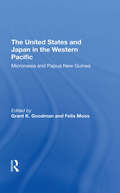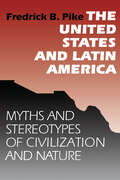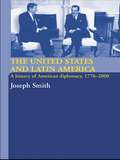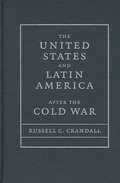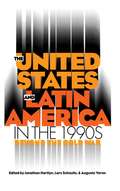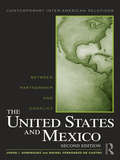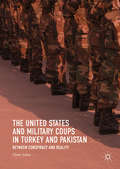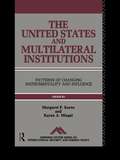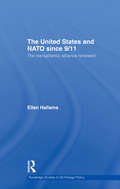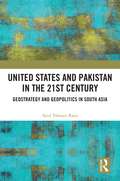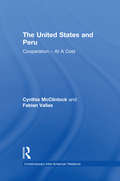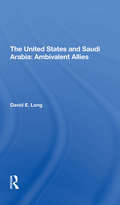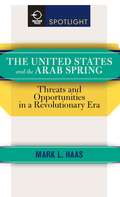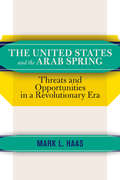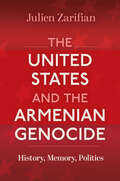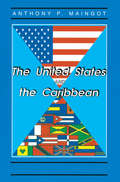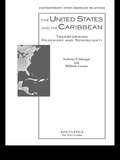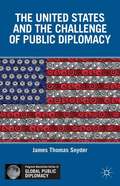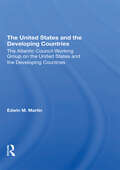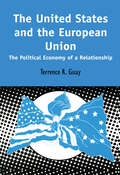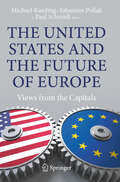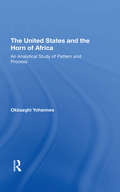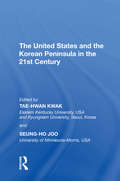- Table View
- List View
United States and Its Neighbors
by Walter C. Parker Mary Mcfarland Gloria Ladson-Billings Jean Craven Gloria Contreras Barry K. Beyer James A. BanksLearn about the history of United States and the countries around it.
The United States And Japan In The Western Pacific: Micronesia And Papua New Guinea
by Grant K Goodman Felix MoosThe interrelationships of the United States and Japan with Micronesia, a U.S. dependency, and Papua New Guinea, a newly independent nation, are the focus of this study. The authors demonstrate that dependence does not by any means automatically terminate by virtue of a legal change in political status. To a surprising extent, Micronesia (the last UN trusteeship) and independent Papua New Guinea depend for their very survival on the United States and Japan. The authors point out that the interests of the United States and Japan in this region too often–and unnecessarily–operate in isolation from one another and in direct conflict. Cooperative U.S.-Japanese efforts are vital in this area; whatever plans are made for the region, they must be island-specific, culturally congruent, politically sensitive, and economically viable.
The United States and Latin America: Myths and Stereotypes of Civilization and Nature
by Fredrick B. PikeThe lazy greaser asleep under a sombrero and the avaricious gringo with money-stuffed pockets are only two of the negative stereotypes that North Americans and Latin Americans have cherished during several centuries of mutual misunderstanding. This unique study probes the origins of these stereotypes and myths and explores how they have shaped North American impressions of Latin America from the time of the Pilgrims up to the end of the twentieth century. Fredrick Pike's central thesis is that North Americans have identified themselves with "civilization" in all its manifestations, while viewing Latin Americans as hopelessly trapped in primitivism, the victims of nature rather than its masters. He shows how this civilization-nature duality arose from the first European settlers' perception that nature—and everything identified with it, including American Indians, African slaves, all women, and all children—was something to be conquered and dominated. This myth eventually came to color the North American establishment view of both immigrants to the United States and all our neighbors to the south.
The United States and Latin America: A History of American Diplomacy, 1776-2000
by Joseph SmithProviding a concise, balanced and incisive analysis of US diplomatic relations with Latin America from 1776 to the end of the twentieth century, this timely work explores central themes such as the structure of international relations, and the pursuit of American national interest by the use of diplomacy, cultural imperialism and economic and military power. Joseph Smith examines: * the rise of the USA as an independent power* its policy towards Latin-American movements for independence* the evolution of the Monroe Doctrine* pan-Americanism* dollar diplomacy* the challenge of communism. Highlighting Latin American responses to US policy over a significant time span, the study documents the development of a complex historical relationship in which the United States has claimed a pre-eminent role, arousing as much resentment as acquiescence from its southern neighbours.Including a timely discussion of the current issues of debt, trade and narcotics control, this unique and valuable study will be of interest to all those with an interest in US and Latin American international relations.
The United States and Latin America after the Cold War
by Russell CrandallIn this book, Crandall examines the policies of three post-Cold War presidential administrations through the prism of three critical areas: democracy, economics, and security. He argues that any lasting analysis must be viewed through a fresh framework that allows for the often unexpected episodes and outcomes in U.S.-Latin American relations.
The United States and Latin America in the 1990s
by Lars Schoultz Augusto Varas Jonathan HartlynA comprehensive examination of both unresolved tensions in inter-American relations and the specific problems facing U.S. and Latin American policymakers in the 1990s.--American Political Science Review "These well-integrated essays analyze the key issues in contemporary inter-American relations very clearly. The authors address their themes with subtlety and insight, in this first overall assessment of North-South relations in the Western Hemisphere during the post-Cold War period.--Christopher Mitchell, New York University "A superb contribution. . . . At a time when U.S.-Latin American relations face a critical turning point, policymakers would benefit from a careful reading of this fine book.--Eduardo A. Gamarra, Florida International University
The United States and Mexico: Between Partnership and Conflict
by Rafael Fernández de Castro Jorge I. DomínguezBy sharing one of the longest land borders in the world, the United States and Mexico will always have a special relationship. In the early twenty-first century, they are as important to one another as ever before with a vital trade partnership and often-tense migration positions. The ideal introduction to U.S.-Mexican relations, this book moves from conflicts all through the nineteenth century up to contemporary democratic elections in Mexico. Domínguez and Fernández de Castro deftly trace the path of the relationship between these North American neighbors from bloody conflicts to (wary) partnership. By covering immigration, drug trafficking, NAFTA, democracy, environmental problems, and economic instability, the second edition of The United States and Mexico provides a thorough look back and an informed vision of the future.
The United States and Military Coups in Turkey and Pakistan: Between Conspiracy and Reality
by Ömer AslanThis comparative study explores the involvement of the United States in four successful military coups in Turkey and Pakistan during the Cold War. Focusing on military-to-military relations with the US in each country, the book offers insight into how external actors can impact the outcomes of coups, particularly through socialization via military training, education, and international organizations such as NATO. Drawing upon recently declassified government documents and a trove of unexplored interviews with high-ranking officials, Ömer Aslan also examines how coup plotters in both countries approached the issue of US reaction before, during, and after their coups. As armed forces have continued to make and unmake Turkish and Pakistani governments well into the twenty-first century, this volume offers original, probing analysis of the circumstances which make coups possible.
The United States and Multilateral Institutions: Patterns of Changing Instrumentality and Influence
by Margaret P. Karns Karen A. MingstWorld politics in the post-Cold War world has become increasingly institutionalized. However, the role of international organizations has been overlooked in much of the literature on international regimes. Now in paperback, The United States and Multilateral Institutions examines United States policy in areas ranging from international trade to human rights, and in institutions such as the International Monetary Fund (IMF), GATT and the World Health Organization.
The United States and NATO since 9/11: The Transatlantic Alliance Renewed (Routledge Studies in US Foreign Policy)
by Ellen HallamsThe US decision not to work through NATO after 9/11 left many European members of the alliance feeling deflated. This decision reflected not only the unilateralism of the Bush Administration, but also the belief that US operational freedom and flexibility had been hampered during NATO's two Balkans interventions. This book examines US attitudes to, and perspectives on, the transatlantic alliance, with a particular focus on US-NATO relations since 9/11. It demonstrates that, following the decision to bypass NATO after 9/11, the Bush Administration's perceptions of the alliance shifted due to a belated recognition that NATO did indeed have much to offer the US. Hallams explores NATO's contributions to post-combat reconstruction and stabilisation operations in Afghanistan and Iraq, and argues that the events of 9/11 galvanised NATO into undertaking an accelerated program of transformation that has done much to reinvigorate the alliance. This book offers an optimistic assessment of the transatlantic alliance, counter-balanced by realistic reflections on the problems it faces. Drawing on interviews with US and NATO officials, it argues that NATO is far from irrelevant and that prospects for the alliance remain fundamentally positive; it will be of interest to students and scholars of US Foreign Policy, American politics, international relations, security studies and transatlantic studies.
United States and Pakistan in the 21st Century: Geostrategy and Geopolitics in South Asia
by Syed Tahseen RazaThis book historically maps and examines the evolving, contemporary geostrategic and geopolitical imperatives of the United States within Pakistan and the South Asian region, especially after September 11, 2001. It offers a detailed and theoretical account of the rapidly changing context of US foreign policy towards Pakistan after 2001. The history of the US-Pakistan relationship has been a complex and inscrutable mix of cooperation and conflict has turned even more challenging after 9/11. This book covers the latest developments and relevant themes from world politics as it discusses the impact of the unprecedented rise in religious extremism in Pakistan, stemming from the US War on Terror as well as Pakistan’s economic vulnerability and military dictatorship, India’s offer to support the US in its war in Afghanistan, Pakistan’s nuclear capability, and the US administration’s decision to end financial aid to Pakistan. The study highlights the fact that, from the receding of British influence in the region through the Cold War and post-Cold War phases to the post-9/11 period, US-South Asia policy has been informed by the theoretical paradigm of the grand strategy of primacy. This topical book will be useful to scholars and researchers of international relations, politics, political studies, strategic and defence studies, security and peace studies, foreign policy, area studies, and South Asian studies. It will also interest diplomats, politicians, policymakers, security experts, journalists, and think tanks interested in India, Pakistan, and the United States on issues of international politics, world affairs, and terrorism.
The United States and Peru: Cooperation -- At A Cost
by Cynthia McClintock Fabian VallasThe early 1990s marked a critical turning point in the relationship between the United States and Peru. Prior to the election of Albert Fujimori in 1990, the relationship between governments had been contentious. Fujimori, however, sought to work together with the United States regarding issues such as security threats, free-market reform and narcotics control. Yet even with this new spirit of cooperation, the two governments still clashed over international standards of democracy and human rights at a time when most Latin American countries were much more democratic. This work traces the relationship between the two countries from 1990-2000, examining political and military issues, including drug trafficking, guerrillas, human rights violations and the US role in the 1995 war between Peru and Ecuador.
The United States And Saudi Arabia: Ambivalent Allies
by David E. LongU.S.-Saudi relations have been marked by ambivalence since their inception over 50 years ago. The Arab-Israeli conflict, the division between buyer and seller of oil, the superpower-small state dichotomy, and the divergence of cultures, traditions, and perceptions have all contributed to the anomalies that have marked the relationship between the two countries, although mutual interest has, over time, outweighed mutual antagonism. Dr. Long examines the major factors affecting their association—economic, commercial, military, and political as well as oil-related factors—and develops the thesis that each has evolved a unique internal dynamic and an existence independent of the others. It is primarily in times of crisis that the factors have overlapped in the minds of decision makers, Saudi and American alike. The author argues that a knowledge of the development of each individual element is crucial for understanding the intricacies of current U.S.-Saudi relations.
The United States and the Arab Spring
by Mark L. HaasIn this Westview Press Spotlight, Mark L. Haas explores the major political consequences of the Arab Spring protests in North Africa and the Middle East as well as how and why US leaders responded to these developments. A detailed examination of the threats and opportunities to US interests created by the uprisings are prominent in the analysis of the events. Students will learn about the individual protests and aftermath of the Arab Spring as well as the various policies the United States might adopt to best advance US security in the new international environment. The United States and the Arab Spring is an extracted chapter from the 2013 Updated Edition of The Middle East and the United States, Fifth Edition (ISBN 978-0-8133-4914-5), edited by regional experts David W. Lesch and Mark L. Haas. In the full-length edition of the text, scholars and diplomats from the Middle East, Europe, and North America provide an objective, cross-cultural assessment of U. S. policy toward the Middle East and Middle Eastern political history from the First World War through the present.
The United States and the Arab Spring
by Mark L. HaasIn this Westview Press Spotlight, Mark L. Haas explores the major political consequences of the Arab Spring protests in North Africa and the Middle East as well as how and why US leaders responded to these developments. A detailed examination of the threats and opportunities to US interests created by the uprisings are prominent in the analysis of the events. Students will learn about the individual protests and aftermath of the Arab Spring as well as the various policies the United States might adopt to best advance US security in the new international environment.The United States and the Arab Spring is an extracted chapter from the Updated 2013 Edition of The Middle East and the United States, Fifth Edition (ISBN 978-0-8133-4914-5), edited by regional experts David W. Lesch and Mark L. Haas. In the full-length edition of the text, scholars and diplomats from the Middle East, Europe, and North America provide an objective, cross-cultural assessment of US policy toward the Middle East and Middle Eastern political history from the First World War through the present.
The United States and the Arab Spring: Threats and Opportunities in a Revolutionary Era (Westview Press Spotlight Ser.)
by Mark L. HaasIn this Westview Press Spotlight, Mark L. Haas explores the major political consequences of the Arab Spring protests in North Africa and the Middle East as well as how and why US leaders responded to these developments. A detailed examination of the threats and opportunities to US interests created by the uprisings are prominent in the analysis of the events. Students will learn about the individual protests and aftermath of the Arab Spring as well as the various policies the United States might adopt to best advance US security in the new international environment. The United States and the Arab Spring is an extracted chapter from the 2013 Updated Edition of The Middle East and the United States, Fifth Edition, edited by regional experts David W. Lesch and Mark L. Haas. In the full-length edition of the text, scholars and diplomats from the Middle East, Europe, and North America provide an objective, cross-cultural assessment of U.S. policy toward the Middle East and Middle Eastern political history from the First World War through the present.
The United States and the Armenian Genocide: History, Memory, Politics (Genocide, Political Violence, Human Rights)
by Julien ZarifianDuring the first World War, over a million Armenians were killed as Ottoman Turks embarked on a bloody campaign of ethnic cleansing. Scholars have long described these massacres as genocide, one of Hitler’s prime inspirations for the Holocaust, yet the United States did not officially recognize the Armenian Genocide until 2021. This is the first book to examine how and why the United States refused to acknowledge the Armenian Genocide until the early 2020s. Although the American government expressed sympathy towards the plight of the Armenians in the 1910s and 1920s, historian Julien Zarifian explores how, from the 1960s, a set of geopolitical and institutional factors soon led the United States to adopt a policy of genocide non-recognition which it would cling to for over fifty years, through Republican and Democratic administrations alike. He describes the forces on each side of this issue: activists from the US Armenian diaspora and their allies, challenging Cold War statesmen worried about alienating NATO ally Turkey and dealing with a widespread American reluctance to directly confront the horrors of the past. Drawing from congressional records, rare newspapers, and interviews with lobbyists and decision-makers, he reveals how genocide recognition became such a complex, politically sensitive issue.
The United States and the Caribbean: Challenges of an Asymmetrical Relationship (Warwick University Caribbean Studies)
by Anthony Maingot<p>This book explores the complex interdependence between the small Caribbean states and the United States and looks at their changing relationships throughout history. The main difficulty for the small state is to discern where and when synergies may be found in its relations with more powerful states—in this case, the United States. The need for cooperation among the less powerful states, for sharing interests and values, must be combined with respect on both sides for democratic and human rights. <p>The author traces the history of these relationships from 1823 to the end of the Cold War, then examines the U.S. response to the Marxist challenge. He then turns to an investigation of different aspects of modern Caribbean relations, such as the problems of drug trafficking, offshore interests, and migration. The book concludes with a discussion on the limits to sovereignty and the challenges that have evolved in U.S.-Caribbean studies.
The United States and the Caribbean: Transforming Hegemony and Sovereignty
by Anthony P. Maingot Wilfredo LozanoThis volume provides the first comprehensive assessment of post-Cold War US-Caribbean relations. Focusing on Haiti, the Dominican Republic and Trinidad-Tobago, the book looks at the political history of the region during the Cold War years, the region's current political economy, international security, and issues of migration and crime. Spanning the Caribbean's linguistic and cultural sub regions (Spanish, French, English, and Dutch) it calls attention to the achievements, setbacks, and concerns that are common to the region. The United States and the Caribbean will be of interest to students and scholars of economics, geography and politics and international relations in general.
The United States And The Challenge Of Public Diplomacy
by James Thomas SnyderThrough personal experience and a lively narrative, this book examines the difficulty of communicating in adversarial environments like Iraq and Afghanistan, the complexity of multi-linguistic communications, and the importance of directing American cultural power in the national interest.
The United States and the Developing Countries
by Edwin M. MartinFirst Published in 1977. Part of The Atlantic Council Policy Series. It is customary for policy papers produced by the Atlantic Council Working Groups to direct attention primarily to issues that confront the countries of Western Europe, North America, Japan, Australia, and New Zealand. This policy paper has a somewhat different emphasis, dealing primarily with the issues of development policy facing the United States.
The United States and the European Union: The Political Economy of A Relationship (Contemporary European Studies Ser. #Vol. 8)
by Terrence R. GuayFirst Published in 2001. Routledge is an imprint of Taylor & Francis, an informa company.
The United States and the Future of Europe: Views from the Capitals
by Michael Kaeding Johannes Pollak Paul SchmidtThis book collects 41 national views from EU Member States and neighbouring countries regarding their respective relationship with the United States. It gives evidence of the importance and diversity of transatlantic relations, assesses the potentially disruptive impact of a second Trump presidency and offers policy recommendations. They range from more strategic autonomy and investments in Europe’s security architecture and industrial infrastructure to careful crafting of EU relations with China, deeper cooperation in tech and climate policies, as well as NATO enlargement. While the Trump administration will likely defend its interests and a preference for ‘divide and conquer’, the decades-old call for Europe to speak with one voice vis-à-vis the U.S. is louder than ever. Nonetheless, numerous countries still seem to favour ‘special’ bilateral ties to the U.S. The book explores the ebbs and flows of transatlantic relationships and carefully speculates about the next four years.
The United States And The Horn Of Africa: An Analytical Study Of Pattern And Process
by Okbazghi YohannesThe recent collapse of the bipolar world order has been accompanied by momentous changes, dynamically setting the international system in motion toward an uncertain future. Such a profound transformation of the international system mandates an evaluation of American foreign policy and the role of the United States in this radically changed world order. In this insightful new book, Okbazghi Yohannes examines the role of U.S. foreign policy with regard to the four countries that make up the Horn of Africa: Eritrea, Sudan, Somalia, and Ethiopia. The book begins by analyzing the historical patterns and processes of American policy in relation to the African Horn during and after the Cold War, offering a comprehensive description of the fundamental policy choices of the United States and the means chosen to achieve American objectives in the region. Finally, Yohannes considers the extent to which the American role in the African Horn aided or impeded the emergence of political democracy and the promotion of economic development within the region. By juxtaposing this new method of examination with traditional approaches, the book reveals a greater coherence in the structural relationship between U.S. policy and the politics of the African Horn. Skillfully incorporating informative background material regarding the history, politics, and diplomacy of the countries covered by the study, Yohannes addresses the interests of both the specialist and the general reader.
The United States and the Korean Peninsula in the 21st Century
by Tae-Hwan KwakIn the post-Cold War era, US relations with the two Korean states - the Republic of Korea (ROK) and the Democratic People's Republic of Korea (DPRK) - have been undergoing profound changes, with critical and immediate repercussions for peace and security in the Korean Peninsula and Northeast Asia. This volume examines the key political, security and economic aspects of US-ROK and US-DPRK relations, focusing on the current status, salient issues and future prospects. Drs Kwak and Joo are distinguished professionals in the field and their volume constitutes a very interesting addition to the available literature.

